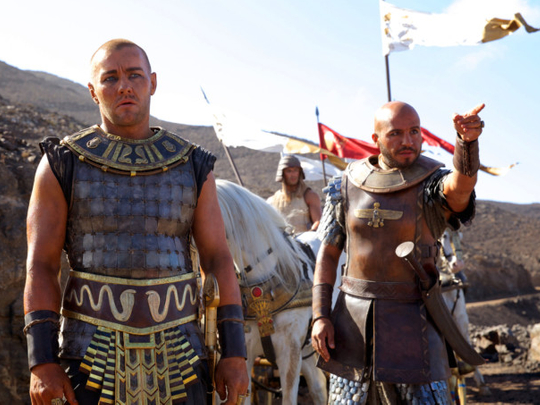
Cairo: Egyptian censors have banned the release of the Hollywood epic “Exodus: Gods and Kings” at local theatres, saying it has “historical inaccuracies”.
Ridley Scott’s 140 million dollar film dramatizes the story of the Prophet Moses and his relations with Egypt’s pharaoh.
“The problem with this film is related to historical facts,” said head of the Egyptian state censorship board, Abdul Sattar Fathi. “One of the key historical mistakes made by this film is that it claims the Jews were the ones who built the Pyramids,” he added in press remarks.
“The film treats Moses as an army general, not as a prophet. Furthermore, it shows ancient Egyptians as a mob group persecuting peaceful Jews. Our board has refused this out of respect for Egyptians’ feelings.”
Fathi said that his agency had not sent the film to Al Azhar, Sunni Islam’s influential Egyptian institution, to examine as is the case with religious works.
“The film also claims that Jews safely departed from Egypt after the sea parted due to an earthquake, not by the divine miracle of Moses’ rod as stated in the Holy Quran. No other views are admissible in this regard.”
Al Azhar has always proscribed the depiction of prophets and companions of the Prophet Mohammad (PBUH). In Islam, Muslims must have faith in all prophets.
“Exodus: Gods and Kings” is the second biblically inspired Hollywood film to be banned in Egypt in less than a year. In March, Egyptian censors banned the blockbuster “Noah”, starring Russell Crowe and Anthony Hopkins, after the film was condemned by religious authorities.
The latest ban has drawn criticism from some intellectuals in Egypt, a predominantly Muslim country.
“Such prohibition is an absurdity,” said film critic Majda Mourice. “If the Censorship Authority thinks that the film has historical errors, then it would be better for it to release the film for public showing and at the same time make a list of these mistakes for the audience,” she added. “The controversy sparked by banning films usually comes to the benefit of their makers. It raises people’s curiosity to search for the banned films to watch them. Modern technology, particularly the Internet, has made this easy.”
In 2004, Egyptian censors approved the public screening of Mel Gibson’s “The Passion of the Christ” on Jesus’s crucifixion amid objections from Al Azhar. However, they also banned the blockbuster “The Da Vinci Code” after condemnation from the Coptic Church.












